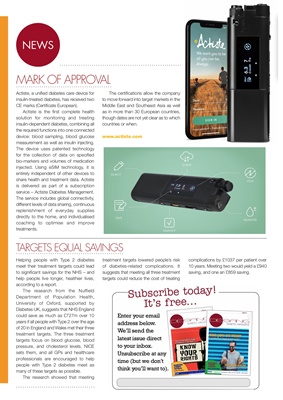
NEWS
MARK OF APPROVAL
Actiste, a unified diabetes care device for
insulin-treated diabetes, has received two
CE marks (Certificate European).
Actiste is the first complete health
solution for monitoring and treating
insulin-dependent diabetes, combining all
the required functions into one connected
device: blood sampling, blood glucose
measurement as well as insulin injecting.
The device uses patented technology
for the collection of data on specified
bio-markers and volumes of medication
injected. Using eSIM technology, it is
entirely independent of other devices to
share health and treatment data. Actiste
is delivered as part of a subscription
service - Actiste Diabetes Management.
The service includes global connectivity,
different levels of data sharing, continuous
replenishment of everyday supplies
directly to the home, and individualised
coaching to optimise and improve
treatments.
The certifications allow the company
to move forward into target markets in the
Middle East and Southeast Asia as well
as in more than 30 European countries,
though dates are not yet clear as to which
countries or when.
www.actiste.com
TARGETS EQUAL SAVINGS
Helping people with Type 2 diabetes
meet their treatment targets could lead
to significant savings for the NHS - and
help people live longer, healthier lives,
according to a report.
The research from the Nuffield
Department of Population Health,
University of Oxford, supported by
Diabetes UK, suggests that NHS England
could save as much as £727m over 10
years if all people with Type 2 over the age
of 20 in England and Wales met their three
treatment targets. The three treatment
targets focus on blood glucose, blood
pressure, and cholesterol levels. NICE
sets them, and all GPs and healthcare
professionals are encouraged to help
people with Type 2 diabetes meet as
many of these targets as possible.
The research showed that meeting
treatment targets lowered people's risk
of diabetes-related complications. It
suggests that meeting all three treatment
targets could reduce the cost of treating
complications by £1037 per patient over
10 years. Meeting two would yield a £940
saving, and one an £859 saving.